Hello guys,
Do you know of any good source, in wich i can find Teutonic, or Templar knights images (Illustrations, statues, etc...) in the web or in any book.
There are in google, a lot of images (Mostly figurines) showing Teutonic knights wearing ¨winged¨ close-helmets.
Do you know if there is any surviving example of such winged helm, or they are only known through art?
Thanks
I have not seen any better examples of period winged crests than are in surviving art. The Manesse Codex shows some winged crests, and is reasonably appropriate for the region and period. You may also encounter tombstones. Photo 12 on this link seems to suggest horns or wing like extensions from a great helm. http://www.pre-construct.com/Sites/Highlights/Bermondsey.htm It is not a Teutonic tombstone, but suggests the idea that the great helm was decorated that way.
This great crests seem more like tournament attire. I would question rather the rank and file Teutonic order members used them in real battle.
This great crests seem more like tournament attire. I would question rather the rank and file Teutonic order members used them in real battle.
I have also found it hard to obtain images of teutonic knights or Knights Templars that are not related to them, or their strongholds being burned!
And also saying that most are not painted at the time, being 14th or 15th century.
I have found A 12th century wall painting - Departure of the Crusaders for the Battle of Boquee in Syria (wall painting), another 12th cenutry wall painting - Hugues IX (c.1163-1219) Lusignan defeating Nur al-Din (1116-74) in Syria (wall painting). Knights on Horseback (14th century), Tyre being blockaded by the Venetian fleet and besieged by Crusader knighthood (vellum and gold leaf).
Your best bet is to look at wall paintings, effegies and mosaics. That said, most images of 'crusading knights' protray knights either wearing partial open helmets, or closed helms without any type of crest or even a plume.
There are a HELL of a lot of 'crusading knights' images painted in 18th and 19th centuries, and perhaps this is where the idea of crests in battle came along - I think it is more likely that a flag and surcote were more practical.
 Attachment: 27.46 KB
Attachment: 27.46 KB
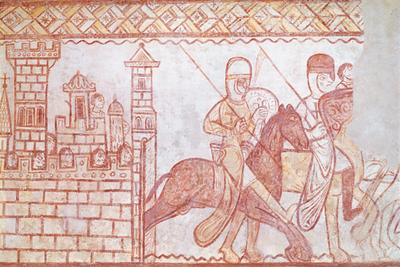
 Attachment: 31.13 KB
Attachment: 31.13 KB
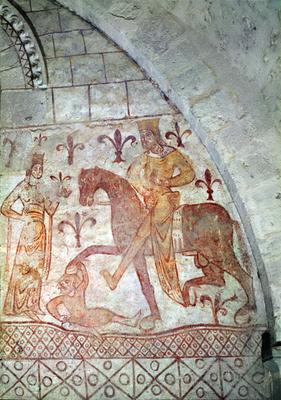
 Attachment: 37.43 KB
Attachment: 37.43 KB
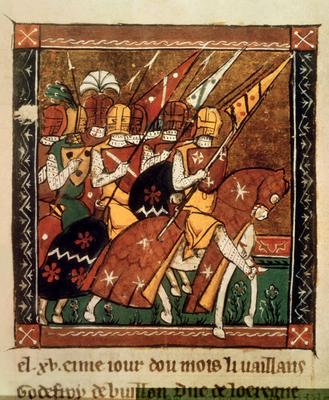
 Attachment: 43.65 KB
Attachment: 43.65 KB
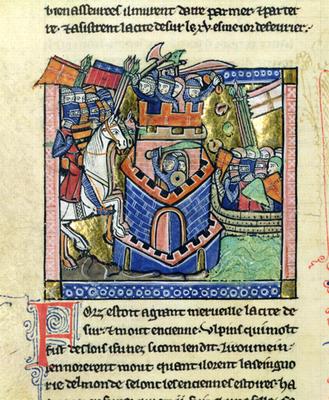
And also saying that most are not painted at the time, being 14th or 15th century.
I have found A 12th century wall painting - Departure of the Crusaders for the Battle of Boquee in Syria (wall painting), another 12th cenutry wall painting - Hugues IX (c.1163-1219) Lusignan defeating Nur al-Din (1116-74) in Syria (wall painting). Knights on Horseback (14th century), Tyre being blockaded by the Venetian fleet and besieged by Crusader knighthood (vellum and gold leaf).
Your best bet is to look at wall paintings, effegies and mosaics. That said, most images of 'crusading knights' protray knights either wearing partial open helmets, or closed helms without any type of crest or even a plume.
There are a HELL of a lot of 'crusading knights' images painted in 18th and 19th centuries, and perhaps this is where the idea of crests in battle came along - I think it is more likely that a flag and surcote were more practical.




Thank you for your answers.
I searched for Codex Manesse, and i found some great images like this one
http://upload.wikimedia.org/wikipedia/commons...häuser.jpg
Do you know how this art style was named?
Frances:
Thanks for your images, all are great, but the last one is awesome, it evens show the single handed axes in wich i´m interested.
I found a pretty nice effigy somewhere in the web, and it is really nice:
Do you know if there is any illustration showing Hungarian knights in codex like Manesse or like the Maciejlowski Bible using this heraldic shield during the second half of the XIII century? (Or at least, not using this, but showing how estern Europe knights looked like)
It is said that Bela IV used this again during XIII century.
http://en.wikipedia.org/wiki/Image:Bela_III_of_Hungary_seal.svg
Thanks
 Attachment: 26.88 KB
Attachment: 26.88 KB
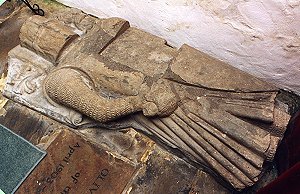
I searched for Codex Manesse, and i found some great images like this one
http://upload.wikimedia.org/wikipedia/commons...häuser.jpg
Do you know how this art style was named?
Frances:
Thanks for your images, all are great, but the last one is awesome, it evens show the single handed axes in wich i´m interested.
I found a pretty nice effigy somewhere in the web, and it is really nice:
Do you know if there is any illustration showing Hungarian knights in codex like Manesse or like the Maciejlowski Bible using this heraldic shield during the second half of the XIII century? (Or at least, not using this, but showing how estern Europe knights looked like)
It is said that Bela IV used this again during XIII century.
http://en.wikipedia.org/wiki/Image:Bela_III_of_Hungary_seal.svg
Thanks

| Rodolfo Martínez wrote: |
|
Do you know how this art style was named? |
I am not sure it has any specific style name other than the generally style of illuminated manuscripts of the era. Some of the images are considered early to mid 14th century, other images later near the end of the 14th century. The difference has to do with the level of detail in illustrated mail. If I remember it right, the mail that is less detailed are considered to be the earlier image style.
| Frances Perry wrote: |
| There are a HELL of a lot of 'crusading knights' images painted in 18th and 19th centuries, and perhaps this is where the idea of crests in battle came along - I think it is more likely that a flag and surcote were more practical. |
But I think it's still likely that at least some men-at-arms did wear substantial crests in battle, especially richer and more distinguished ones. Remember that the helmet was one of the most visible parts of of the man-at-arms's attire, second only to the shield--and we can draw parallels from Japanese samurai who advertised their presence through the personalized designs on their helmets.
| Lafayette C Curtis wrote: |
|
But I think it's still likely that at least some men-at-arms did wear substantial crests in battle, especially richer and more distinguished ones. Remember that the helmet was one of the most visible parts of of the man-at-arms's attire, second only to the shield--and we can draw parallels from Japanese samurai who advertised their presence through the personalized designs on their helmets. |
Some factors are very "decade specific." We know that some of the tournament fanatics of the era (Count Baldwins of Hainault .. late 12th century) were described as only having a painted emblem on their helm in battle. The peacock plumes and other crest type decorations seem to be more consistent in early 13th century. I would hate to have to make a call on this. However, the religious orders appear to have had modest policies concerning adornment. It would be phenomenal to prove or show what the most elite wore in battle, as well as how often they did participate directly in battles. For the rank and file, I would assume to regularly engage in he main battle, I would guess that their banner was the most conspicuous designation meant to be recognized from a distance for the purpose of regrouping on the battlefield. It's just a guess, but that would be my assumption anyway.
hello,
What do you think about this helm?
http://www.istockphoto.com/file_thumbview_app...enburg.jpg
It says that it belonged to the KNight Rider of Ehrenburg.
What do you think about this helm?
http://www.istockphoto.com/file_thumbview_app...enburg.jpg
It says that it belonged to the KNight Rider of Ehrenburg.
That is a great find! Thanks for tracking it down and posting it.
Is this associated with Ehrenburg palace in Bavaria, or the castle keep near Koblenz?
I am guessing (from search results and your initial information), that this might be the helm of one of the wealthy counts of the Rhine Palatine, circa early 13th century. Henry V or VI of Welf family may fit the period and ownership of the Ehrenburg castle. By lineage they were contenders for the position of Holy Roman Emperor. The tiara like impression of the helm sort of fits that theory. The ritters of Ehrenburg castle (http://www.roadstoruins.com/ehrenburg.htm) were known for feuds with near by Koblenz. (Page 171 of "From Rhine to Rotterdam to Constance", Karl Baedeker.) http://books.google.com/books?id=og0JAAAAQAAJ...#PPA171,M1
Is this associated with Ehrenburg palace in Bavaria, or the castle keep near Koblenz?
I am guessing (from search results and your initial information), that this might be the helm of one of the wealthy counts of the Rhine Palatine, circa early 13th century. Henry V or VI of Welf family may fit the period and ownership of the Ehrenburg castle. By lineage they were contenders for the position of Holy Roman Emperor. The tiara like impression of the helm sort of fits that theory. The ritters of Ehrenburg castle (http://www.roadstoruins.com/ehrenburg.htm) were known for feuds with near by Koblenz. (Page 171 of "From Rhine to Rotterdam to Constance", Karl Baedeker.) http://books.google.com/books?id=og0JAAAAQAAJ...#PPA171,M1
Page 1 of 1
You cannot post new topics in this forumYou cannot reply to topics in this forum
You cannot edit your posts in this forum
You cannot delete your posts in this forum
You cannot vote in polls in this forum
You cannot attach files in this forum
You can download files in this forum
All contents © Copyright 2003-2006 myArmoury.com — All rights reserved
Discussion forums powered by phpBB © The phpBB Group
Switch to the Full-featured Version of the forum
Discussion forums powered by phpBB © The phpBB Group
Switch to the Full-featured Version of the forum